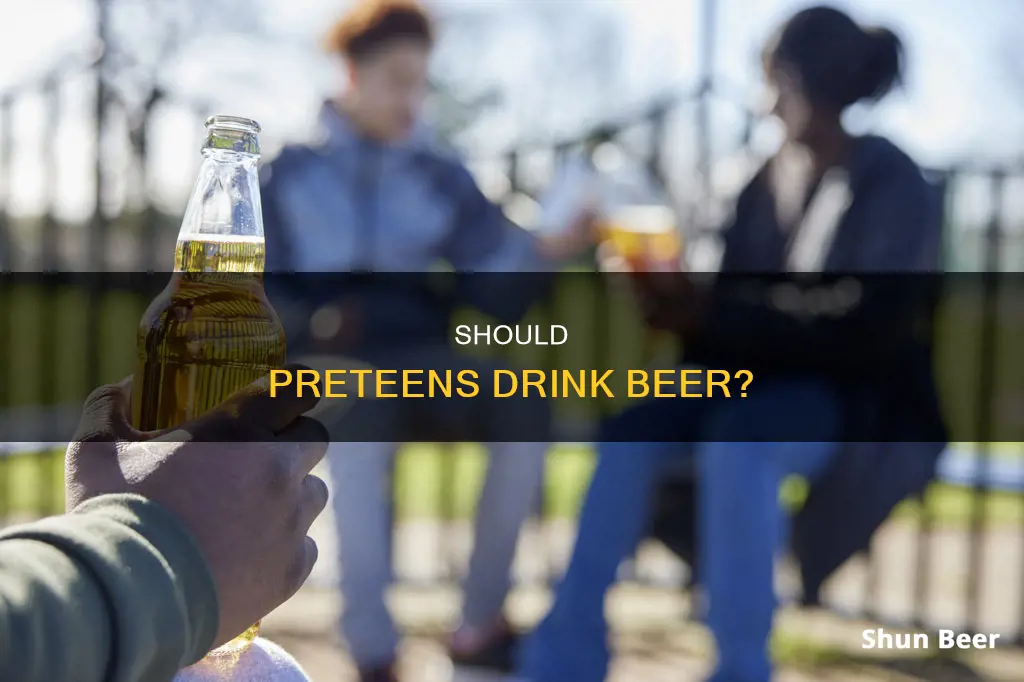
It is illegal and unsafe for 11-year-olds to drink beer or any other type of alcohol. Official guidelines from the Department of Health are clear: children aged 15 or under should not drink alcohol. However, this doesn't stop some children from drinking before they become teenagers. A study found that 22% of children aged 9 to 11 years old had sipped alcohol, most commonly beer from their father. This early exposure to alcohol can lead to increased drinking later in life.
| Characteristics | Values |
|---|---|
| Official guidelines regarding alcohol consumption by 11-year-olds | Official guidelines from the Department of Health state that children aged 15 or under should not drink alcohol. |
| Percentage of 11-year-olds drinking alcohol | At age 11, just under 14% of children in a cohort said they drank alcohol. |
| Percentage of 11-year-olds whose friends drink alcohol | When asked whether their friends drank alcohol, 78% of 11-year-olds said "no." |
| Parental influence on 11-year-olds drinking alcohol | 11-year-olds whose parents drink heavily are almost twice as likely to drink themselves. |
| Impact of early alcohol exposure | Studies suggest that even small sips of alcohol in childhood can have long-term impacts and increase the likelihood of excessive drinking during teenage years. |
| Risks associated with underage drinking | Alcohol can cause low blood sugar, coma, and problems regulating body temperature in children. |
What You'll Learn

The influence of parents' drinking habits on 11-year-olds
It is natural for parents to worry about their children's future decisions and wonder how their own habits might influence their children's behavior. When it comes to the topic of "Can 11-year-olds drink beer?" the answer is a clear no. Official guidelines from the Department of Health state that children under the age of 15 should refrain from consuming alcohol. However, this doesn't prevent some 11-year-olds from experimenting with alcohol.
The drinking habits of parents have a significant impact on their children's attitudes and behaviors towards alcohol. Research has found that 11-year-olds with parents who drink heavily are almost twice as likely to start drinking themselves, especially if their mother is a heavy drinker. This influence is not limited to the immediate family; the behavior of peers also plays a role. Children whose friends drink are more than four times as likely to drink themselves.
The home environment and family dynamics are also contributing factors. Children who report higher levels of family conflict and low parental supervision are more likely to engage in risky behaviors, including drinking. Additionally, a child's perception of alcohol's risks and harms influences their drinking behavior. Children who do not view alcohol as a risky substance are more likely to drink, especially if their mother is a heavy drinker.
To reduce the risk of early alcohol consumption by children, it is important for parents to model healthy drinking habits or abstain from drinking altogether. Parents should also communicate their disapproval of underage drinking and set clear rules and expectations. By doing so, studies show that children are less likely to drink alcohol.
Furthermore, societal factors, such as a higher minimum legal drinking age, higher alcohol taxes, and reduced availability of alcohol, have been proven to decrease rates of binge drinking. Supporting and advocating for such policies can help create a safer environment for children and reduce the likelihood of early alcohol consumption.
Beer After Laparoscopic Gastrectomy: What You Should Know
You may want to see also

The dangers of underage drinking
It is clear that underage drinking is extremely dangerous and can have serious consequences. The legal drinking age is 21, and this is to keep children and young people healthy and safe. Alcohol can cause damage to the developing brains of young people, and even block the development of healthy mental pathways. This can have lifelong physical, social, and emotional consequences.
Brain Development
The brains of young people are still developing, and alcohol can alter this development, affecting both brain structure and function. This can cause cognitive or learning problems and increase vulnerability to alcohol use disorder (AUD). Alcohol can shut down new brain cell growth and damage the parts of the brain responsible for learning, memory, and self-control.
Risk of Death and Injury
Underage drinking is a factor in the deaths of people under 21 in the US each year. This includes motor vehicle crashes, homicides, alcohol overdoses, falls, burns, drowning, and suicides. In 2011, around 188,000 people under 21 visited the emergency room for alcohol-related injuries. Alcohol lowers inhibitions and impairs judgment, leading to risky behaviours such as unsafe sexual behaviour, drinking and driving, and aggressive or violent behaviour.
Health Problems
Drinking during puberty can disrupt hormones in the body, affecting growth and development. Heavy alcohol use increases the risk of liver disease, heart disease, and cancer later in life. Alcohol is also linked to mental health problems, with higher rates of depression, anxiety, and suicide among young drinkers.
Addiction
There is always a risk that substance use may lead to addiction. Research shows that people who start drinking before the age of 15 are at a higher risk of developing AUD later in life.
Binge Drinking
Underage drinking often involves binge drinking, which is particularly dangerous for children. Binge drinking increases the risk of alcohol poisoning, and can lead to serious injury or death.
Social and Legal Consequences
Underage drinking can cause issues at school, with friends, and with the law. It is also associated with a higher risk of physical and sexual assault.
Beer and SIBO: What You Need to Know
You may want to see also

The short-term effects of alcohol on young people
It is clear that children under the age of 15 should not be drinking alcohol. Official guidelines from the Department of Health state that children aged 15 or under should not consume alcohol. However, research has found that 11-year-olds do drink alcohol, and this is influenced by their parents' drinking habits.
Additionally, drinking alcohol can impair a young person's judgement and decision-making abilities. They may engage in risky behaviours such as drink driving, swimming, unsafe sex, or fighting. Binge drinking, which is common among young people, can lead to vomiting, head spins, passing out, and hangovers. Alcohol also affects a person's ability to give consent, and engaging in sexual activities with someone who is drunk or under the influence is considered sexual assault.
Furthermore, alcohol can interfere with vitamin B absorption, impacting the brain's function and leading to potential health issues in the future. Young people who drink are also more likely to develop unhealthy drinking habits later in life. Research has shown that children who are offered alcohol at a young age are more likely to drink excessively as teenagers.
It is important for parents and caregivers to model healthy drinking habits and encourage open communication about alcohol to help young people make informed decisions and reduce the risks associated with alcohol consumption.
Beer Connoisseurs Explore 20% Alcohol Brews: Safe to Drink?
You may want to see also

The long-term effects of alcohol on young people
The Department of Health's official guidelines are clear: children aged 15 or under should not drink alcohol. However, research has shown that 11-year-olds whose parents drink heavily are almost twice as likely to drink themselves. Early alcohol consumption can have long-term effects on young people, including:
- Poor school performance: Alcohol use is associated with lower academic achievement and poor performance in school.
- Addiction and dependence: Those who start drinking at a younger age are more likely to develop alcohol dependence or addiction later in life.
- Increased risk of suicide: Alcohol use is linked to a higher risk of suicide attempts and completion, especially among those with pre-existing mental health issues.
- Violence and risky behaviour: Underage drinking is correlated with violent behaviour, risky sexual activity, and other harmful behaviours.
- Brain development: Research suggests that alcohol can negatively impact the developing adolescent brain, leading to potential long-term cognitive and behavioural issues.
- Health issues: Heavy drinking during adolescence can increase the risk of chronic health problems such as pancreatitis, liver cirrhosis, hypertension, and anaemia. It can also lead to fertility issues, decreased sperm count, and an increased risk of various types of cancer.
- Driving and safety: Alcohol impairs judgement and coordination, increasing the risk of accidents, especially when driving. Young people who drink are also more likely to engage in risky behaviours such as not wearing a seatbelt.
- Social and financial problems: Alcohol can reduce inhibitions and lead to antisocial behaviour, affecting relationships and finances.
Great Wolf Lodge: Beer Drinking Rules Explained
You may want to see also

How to talk to 11-year-olds about alcohol
It is illegal and unsafe for 11-year-olds to drink beer or any other alcoholic beverage. Official guidelines from the Department of Health are clear: children aged 15 or under should not drink alcohol.
Choose the Right Time
Avoid starting a discussion just as they’re about to go out or before bed. Try to approach it as part of an ongoing conversation, and don't make it a one-time lecture. Be calm and honest, and keep the lines of communication open.
Make it a Conversation
Listen as much as you talk. Avoid coming across as judgmental, critical, or disapproving. Be open to answering their questions and be guided by what they already know. If you can, share your own experiences and the reasons why adults drink, and how it can be done responsibly.
Explain the Risks
Explain the dangers of drinking for growing bodies and minds. Talk about the short-term effects of alcohol, like distorted vision, hearing, and coordination, altered perceptions and emotions, and impaired judgment. Also, mention the long-term effects, such as heart and brain damage. You can also discuss how drinking can lead to alcohol problems later in life, negatively impact school performance, increase the likelihood of high-risk sexual activity, and hurt athletic performance.
Teach Them to Say No
Give them tools to handle peer pressure. Let them know that it's okay to say no, and provide them with excuses they can use if they feel pressured to drink. For example, they could say that they have an important event coming up and can't risk a hangover or that they don't want to drink because they've seen the negative impact it has had on their family.
Set Clear Rules and Boundaries
Let your child know that you do not want them drinking alcohol. Explain the consequences of breaking these rules and the sanctions that will follow. Be a role model by drinking responsibly or not at all, and never use alcohol as a stress reliever. Show them that there are other ways to unwind, like exercising or spending quality time with family.
Encourage Open Conversations
Ask open-ended questions and encourage your child to share their thoughts and feelings about alcohol. Be curious about their understanding and address any misconceptions they may have. If they are curious about alcohol, it's better to provide accurate information than to let them learn from unreliable sources or peers.
Remember, your attitude and behaviour as a parent have a strong influence on your child's decisions. By having honest conversations, setting clear boundaries, and leading by example, you can help your 11-year-old develop a healthy understanding of alcohol and make informed choices.
Whiskey and Beer: A Dangerous Cocktail?
You may want to see also
Frequently asked questions
No, official guidelines from the Department of Health are clear that children aged 15 or under should not drink alcohol.
There is no amount of alcohol that is considered safe for children. Children metabolize alcohol faster than adults, which can lead to high blood alcohol concentrations, low blood sugar, coma, and problems regulating body temperature.
Allowing children to drink alcohol can lead to a range of problems later in life, including high-risk sexual activity and alcohol abuse.
Share your feelings against underage drinking and model healthy habits. Make it clear that you disapprove of underage drinking and set rules around alcohol.







